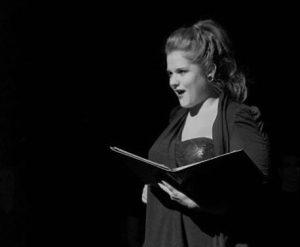
As part of an effort to increase awareness about violence against women, members of Alpha Psi Omega, the national theater honor society, performed A Memory, a Monologue, a Rant, and a Prayer, a series of monologues compiled by Eve Ensler, on Feb. 12-13 in the Bea Wood Studio Theatre.
The play, featuring 10 monologues selected from the collection of 20 possibilities, was produced for V-day, a global movement that stands for victory, valentine, and vagina. Founded to end violence against women and girls, this foundation was created by Eve Ensler who also authored The Vagina Monologues. Thirty six tickets were sold for Friday’s show and 32 were sold for Saturday’s show, according to the theater’s publicity office.
MMRP delivered, thanks to standout performances from Jonathan Stone, Kelly Tachiera, Autumn Dahl and Sarah Dempsey, with only a few monologues falling flat.
THE BEST
Untitled by Nicholas D. Kristof, performed by Jonathon Stone
Stone did an amazing job telling the story of a journalist who, while working on-site at a Cambodian brothel, faced a harrowing inner battle between his professional duty to remain objective and his moral obligation to help two young sex workers. Stone was a powerhouse with this piece — the raw emotion and pure talent exhibited by Stone did not go unrecognized. This scene was so powerful, I was in shock when he described the terrible conditions the girls were in.
Groceries by Abiola Abrams, performed by Kelly Tachiera
Groceries is a scene involving a woman who can’t carry all of her groceries up to her apartment on one trip. When she begins to go back for the rest, her neighbor’s smooth-talking boyfriend grabs her remaining bags and climbs the steps to her apartment. But when he reaches her door, he turns violent, rapes her and threatens her with a knife. Tachiera’s depiction was exorbitantly moving to the point that when she described how her mind wouldn’t die, I was near tears. Every facet of her performance was perfectly presented and well-rehearsed. Groceries tells one woman’s rape story but unfortunately, it could’ve been the story of so many women. Tachiera took a story all too commonplace in today’s society and gave it the passionate delivery it deserved.
1600 Elmwood Avenue by Monica Szlekovics, performed by Autumn Dahl
The monologue is a memory from the writer who visited her mother at 1600 Elmwood Avenue, a mental institution disguised as a “hospital” where she saw her mom chained and surrounded by her own filth. Then, the writer compares herself to her mother by revealing that she is in an “asylum that has been conspicuously designed as a correction institution.” Dahl, who portrayed Szlekovics, was fantastic as she relived the pervasive despair of her childhood and compared her memories to her adult life.
Blueberry Hill by Christine House, performed by Sarah Dempsey
Blueberry Hill is the story of a young college woman who goes to hang out with her “friends,” and ends up being raped. As she fights back, some of the guys left but a few continued until someone shouted “she isn’t worth it.” Dempsey’s portrayal of this woman was more in-character and relatable than her role in Celia and she did a fantastic job on all theatrical fronts of her performance.
THE MIDDLE
Celia by Edwidge Danticat, performed by Sarah Dempsey
Delving right into the thick of the plot, this monologue begins with the cries of a young hispanic woman gasping for breath. The audience soon learns that Celia, the main character, is in a tight box as she is smuggled from Guatemala up through Mexico and into Texas, fleeing an abusive husband. Dempsey did a wonderful job even though her Spanish accent could use some work, but it did not take away from her strong emotional ties to the slowly-dying Celia.
Fur is Back by Eve Ensler, performed by Emma Brown
This story follows a girl’s night at a party where she is fed up with the mindless chatter of the party-goers. When someone asks Brown, “What’s up” she responds about women’s issues and militant action in the Middle East, penetrating the trivial facade of the party. The monologue’s title derives from the woman telling people about her new coat, and then when she is finally fed up with the partiers, she starts to scream “Rape is back, the Taliban is back, back back back!”. Brown pulls that deep-seeded and often buried anger out of herself and it shows it during her screaming fit.
My House is Wallpapered with Lies by Carol Gilligan, performed by Emma Brown, Christopher Cruz and Kalli Root
In this scene, the audience sees three siblings as they talk about their mother. They relive memories of their mother beaten by their father and being in school asking unsettling questions to their teacher. Gilligan, Brown and Cruz all did a wonderful job in this scene. Their chemistry made their roles as siblings feel seamless and the way the directors used them in various positions was immaculate.
Banana Beer Bath by Lynn Nottage, performed by Tessa Rae Dschaak
This monologue was a very interesting piece. The main subject is a beautiful girl living outside of a village with her parents and two sisters. During a rebellion, the family hears footsteps of soldiers coming up the hill and their father forces the daughters to hide inside a vat of his special Banana Beer he has fermenting in the backyard. Dschaak did a great job portraying the terror the young girl felt as she hid for multiple days with her sisters
NEEDS SOME WORK
I Can’t Wait by James Lecesne performed by Crystal Carter
The monologue showed the dreams of a young actress, employed to work as a dead or beaten prostitute on television. Carter has dreams of making it big as a mainstream actress who can portray real emotions rather than playing a small, insignificant part. Carter didn’t seem to have any problem tapping into the emotions behind the monologue. She did, however, stumble over her lines.
The Closet by Howard Zinn performed by Joseph Evans
This monologue stood apart from its counterparts — it showcased a young boy in his small home watching his father build a cardboard closet for his mother. As the story progresses, the father grows tired and angry because he can not assemble the closet and the matriarch of the story pressures the father to keep building until the father slams a piece of the cardboard on to the mother’s head. Evans seemed too involved in his lines to bring out the emotion that this scene required. While the story was still understood, it was very flat, lacking the depth and richness I was hoping for.







